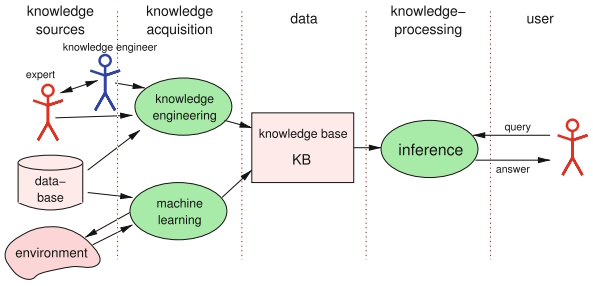An agent is a program that implements a mapping from perceptions to actions. For simple agents this way of looking at the problem is sufficient. For complex applications in which the agent must be able to rely on a large amount of information and is meant to do a difficult task, programming the agent can be very costly and unclear how to proceed. Here AI provides a clear path to follow that will greatly simplify the work.

Fig. 1.7 Structure of a classic knowledge-processing system
First we separate knowledge from the system or program, which uses the knowledge to, for example, reach conclusions, answer queries, or come up with a plan. This system is called the inference mechanism. The knowledge is stored in a knowledge base (KB). Acquisition of knowledge in the knowledge base is denoted Knowledge Engineering and is based on various knowledge sources such as human experts, the knowledge engineer, and databases. Active learning systems can also acquire knowledge through active exploration of the world. In Fig. 1.7 the general architecture of knowledge-based systems is presented.
Moving toward a separation of knowledge and inference has several crucial advantages. The separation of knowledge and inference can allow inference systems to be implemented in a largely application-independent way. For example, application of a medical expert system to other diseases is much easier by replacing the knowledge base rather than by programming a whole new system.
Through the decoupling of the knowledge base from inference, knowledge can be stored declaratively. In the knowledge base there is only a description of the knowledge, which is independent from the inference system in use. Without this clear separation, knowledge and processing of inference steps would be interwoven, and any changes to the knowledge would be very costly.
Formal language as a convenient interface between man and machine lends itself to the representation of knowledge in the knowledge base. First, there are propositional calculus and first-order predicate logic (PL1). There are other formalisms such as probabilistic logic and decision trees. We start with propositional calculus and the related inference systems. Building on that, we will present predicate logic, a powerful language that is accessible by machines and very important in AI.
As an example for a large scale knowledge based system we want to refer to the software agent "Watson". Developed at IBM together with a number of universities, Watson is a question answering program, that can be fed with clues given in natural language. It works on a knowledge base comprising four terabytes of hard disk storage, including the full text of Wikipedia. Watson was developed within IBM's DeepQA project which is characterized as follows:
The DeepQA project at IBM shapes a grand challenge in Computer Science that aims to illustrate how the wide and growing accessibility of natural language content and the integration and advancement of Natural Language Processing, Information Retrieval, Machine Learning, Knowledge Representation and Reasoning, and massively parallel computation can drive open-domain automatic Question Answering technology to a point where it clearly and consistently rivals the best human performance.
In the U.S. television quiz show "Jeopardy!", in February 2011, Watson defeated the two human champions Brad Rutter and Ken Jennings in a two-game, combined-point match and won the one million dollar price. One of Watson's particular strengths was its very fast reaction to the questions with the result that Watson often hit the buzzer (using a solenoid) faster than its human competitors and then was able to give the first answer to the question.
About the Author
Dr. Wolfgang Ertel is a professor at the Institute for Artificial Intelligence at the Ravensburg-Weingarten University of Applied Sciences, Germany.
This accessible and engaging textbook presents a concise introduction to the exciting field of artificial intelligence (AI). The broad-ranging discussion covers the key subdisciplines within the field, describing practical algorithms and concrete applications in the areas of agents, logic, search, reasoning under uncertainty, machine learning, neural networks, and reinforcement learning. Fully revised and updated, this much-anticipated second edition also includes new material on deep learning.
Topics and features:
• Presents an application-focused and hands-on approach to learning, with supplementary teaching resources provided at an associated website
• Contains numerous study exercises and solutions, highlighted examples, definitions, theorems, and illustrative cartoons
• Includes chapters on predicate logic, PROLOG, heuristic search, probabilistic reasoning, machine learning and data mining, neural networks and reinforcement learning
• Reports on developments in deep learning, including applications of neural networks to generate creative content such as text, music and art
• Examines performance evaluation of clustering algorithms, and presents two practical examples explaining Bayes theorem and its relevance in everyday life
• Discusses search algorithms, analyzing the cycle check, explaining route planning for car navigation systems, and introducing Monte Carlo Tree Search
• Includes a section in the introduction on AI and society, discussing the implications of AI on topics such as employment and transportation
Ideal for foundation courses or modules on AI, this easy-to-read textbook offers an excellent overview of the field for students of computer science and other technical disciplines, requiring no more than a high-school level of knowledge of mathematics to understand the material.
A reader says,"The book has a substantial introduction to logic that was very helpful. Overall the selection of topics was perfect for a first course in AI."
A reader says,"An excellent book for beginners. Would like to have seen code examples in python. I realize python is not much historic for AI but it is lingua franca for data science and deep learning today. Good treatment of many topics on search etc. Definitely a great resource for those just getting started in AI."
Click here for more information.



